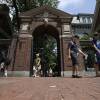Once you’ve broken a barrier, what’s the point of breaking it again?
“So this is actually a very, very good question,” said Sylvain Bruni of Boston Pride.
Bruni’s group was one of two gay organizations that successfully applied and marched in the South Boston St Patrick’s Day parade last year for the first time. Weather-wise, it was miserable – cold and rainy. And it will probably be that way for the parade this weekend too. But Bruni says he has to march again, just to make sure gay people are present and visible as part of the festivities.
“We’ve seen how quickly rights can be taken back, and how quickly the LGBT community -- despite general progress -- can experience setbacks and discrimination,” Bruni said.
Some in the Catholic community hope the parade does go back to excluding gays. And parade organizers still won’t allow gay participants to wave rainbow flags. Those organizers, the South Boston Allied War Veterans Council, see rainbows as political expression. People like Kristen Porter don’t.
“I believe I should be able to express myself both as an Irish American and a gay American. Through both the rainbow and the Irish flag,” she said.
Porter says that even though, from her perspective, South Boston’s come a long way. The parade has a long history of fighting the gay community’s inclusion. Porter lived on the parade route in the early 90s, when gay groups won court orders to march.
“I remember … as I stood on my front stoop, I was so excited as the LGBT group was approaching. But that was really quickly deadened because of the slurs that were shouted and the just outward hostility of the parade goers around us,” Porter says. “I have to say it really did change my relationship – not only with my neighbors but even with my family members.”
In 1994 the Veterans Council canceled the parade rather than let gay groups march.
It also appealed all the way to the US Supreme Court. In 1995 justices ruled unanimously that parade organizers have the right to exclude whomever they like. The ban against gay groups went up and stayed up until last year, when the council voted the ban down.
But that doesn’t necessarily have to be a permanent move, says CJ Doyle of the Catholic Action League of Massachusetts.
“We think it’s impossible to honor St Patrick by providing a platform for those who not only express pride in rejecting the moral beliefs of St Patrick’s religion but who castigate those beliefs as bigotry and prejudice and hatred,” he says.
Doyle says 4,400 people have signed his group’s online petition to change the parade’s name from St Patrick’s to the Evacuation Day Parade. That way it would celebrate the continental army’s success in forcing the British to evacuate Boston in 1776 – instead of being associated with a Catholic saint.
“Groups like Outvets and Boston Pride have no interest in honoring St Patrick for bringing the Catholic faith to Ireland,” Doyle says. “They’re exploiting the Catholic faith to gain public acceptance to gain public acceptance of their ideology.”
The Veterans Council doesn’t seem to agree. It didn’t respond to requests for comment, but Brian Bishop, executive director of the gay veterans group OutVets, says the council has become much more welcoming.
Last year, Bishop says… “there was a lot of infighting, a lot of questions about why were we there, why did we want to be a part of it, and they couldn’t get past the gay thing.”
This year, though, “we were actually invited to participate... Getting the call from South Boston to actually invite us that they actually recognize our service – was fantastic.”
But while the parade might have become more welcoming to gay people, not everyone thinks South Boston has. Andrew Rayner’s a Harvard grad student and community director for the Boston Welcoming Committee – a group that hosts events for the gay community.
“Most of my gay friends aren’t going down to Southie for St Patrick’s Day because they don’t want to be there anyway, in the first place,” he says.
Still, Rayner says he supports and respects gay people who think being included in the parade is important, and are willing to walk in the cold rain for hours to prove it.



